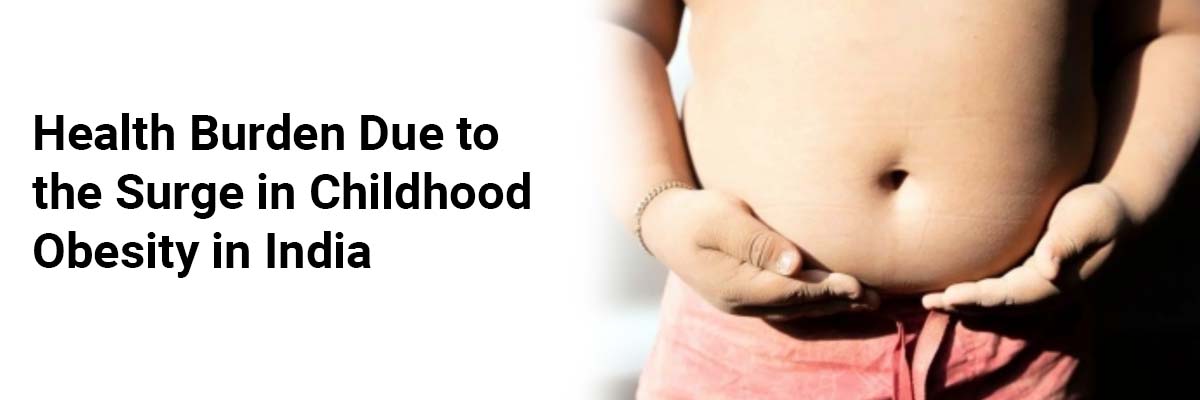
 Mrs. Mayuri Mathur
Mrs. Mayuri Mathur
Health Burden Due to the Surge in Childhood Obesity in India
Rising Childhood Obesity in India
Childhood overweight and obesity have nearly doubled in Indian urban areas. In 2020, around 4.2% of children were reported to be overweight based on weight-for-height criteria. Projections suggest that by 2030, India could have more than 27 million obese children, posing a significant public health challenge.
Key Factors Contributing to Childhood Obesity
Genetic Factors – Approximately 5% of childhood obesity cases are linked to genetics.
Dietary Changes – Traditional healthy diets are increasingly replaced by Westernized eating habits. The high consumption of processed foods rich in sugar and unhealthy fats is a major driver.
Dining Out and Food Delivery Apps – Easy access to HFSS (High Fat, Salt, Sugar) foods has increased unhealthy eating patterns.
Psychological & Behavioral Factors – Adolescents often use binge eating as a coping mechanism, influenced by brain reward pathways.
Sedentary Lifestyle – Urbanization has reduced outdoor playtime, with children spending more hours on screen-based activities.
Lack of Physical Education in Schools – Limited focus on exercise and fitness activities adds to the problem.
Socioeconomic Influence – Surprisingly, higher socioeconomic status is associated with increased childhood obesity risks.
Long-Term Health Implications
Childhood obesity is not just an immediate concern but also a long-term health risk. It increases the likelihood of developing chronic diseases such as:
Psychological issues like low self-esteem and depression
Preventive Measures and Strategies
The World Health Organization (WHO) recommends a multi-level approach to address childhood obesity:
Parental Nutrition & Early Interventions
Educating parents about balanced diets.
Early detection of gestational diabetes.
Encouraging physical activity from a young age.
Curbing Obesogenic Environments
Policy measures such as restricting junk food outlets near schools.
Encouraging celebrity endorsements against HFSS products.
Promoting healthier food advertising.
School & Community Engagement
Active awareness campaigns for students and parents.
Inclusion of compulsory physical education.
Pediatricians emphasize healthy lifestyle choices during routine visits.
Learning from Global Best Practices
Countries like Brazil (advertising restrictions) and Ireland (ban on celebrity endorsements targeting children) provide valuable models for India. The Indian Academy of Pediatrics (IAP) is also preparing guidelines and organizing conclaves to strengthen awareness and prevention. For a deeper dive into effective interventions, practical resources, and medical guidance, read the Obesity Clinical Challenges Guide.
FAQs on Childhood Obesity in India
1. What is the current status of childhood obesity in India?
Childhood obesity has nearly doubled in urban India, with 4.2% of children overweight in 2020. By 2030, more than 27 million children may be obese.
2. What are the major causes of childhood obesity in India?
Key causes include Westernized diets, processed foods, sedentary lifestyles, reduced outdoor activities, lack of physical education, and higher socioeconomic status.
3. How does childhood obesity affect long-term health?
It increases the risk of type 2 diabetes, cardiovascular diseases, hypertension, and psychological disorders in adolescence and adulthood.
4. Can childhood obesity be prevented?
Yes. Through parental education, early interventions, healthier diets, regular exercise, and supportive policies, childhood obesity can be prevented.
5. What policies can help reduce childhood obesity in India?
Restricting junk food outlets near schools, regulating food advertisements, banning celebrity endorsements for HFSS products, and introducing strong awareness campaigns are effective measures.
6. What role do schools and parents play in prevention?
Schools can encourage physical activity and nutrition education, while parents can promote healthy eating habits, limit screen time, and set examples of active living.

Mrs. Mayuri Mathur
Mrs. Mayuri Mathur is a Senior Medical Writer (Patient education and digital) and seasoned content creator with a rich tapestry of expertise spanning over ten years. With a diverse background in content creation, she brings a wealth of experience to the table, from crafting insightful medical articles to developing comprehensive patient education materials, dynamic press releases, and captivating brochures and website content. Throughout her illustrious career, she has demonstrated an exceptional knack for distilling complex medical concepts into easily understandable content, making her a trusted resource for both professionals and lay audiences alike. Her meticulous attention to detail and innate creativity have enabled her to deliver content that not only informs but also engages and inspires. Whether elucidating intricate medical procedures or crafting compelling marketing materials, her versatility and dedication shine through in every project she undertakes. Her passion for writing, coupled with her profound understanding, makes her an invaluable asset to any team or project. In a constantly evolving digital landscape, where effective communication is paramount, Mrs. Mayuri Mathur stands out as a beacon of excellence, consistently delivering top-notch content that resonates with audiences across diverse platforms.

.png)

.png)
.png)





Please login to comment on this article